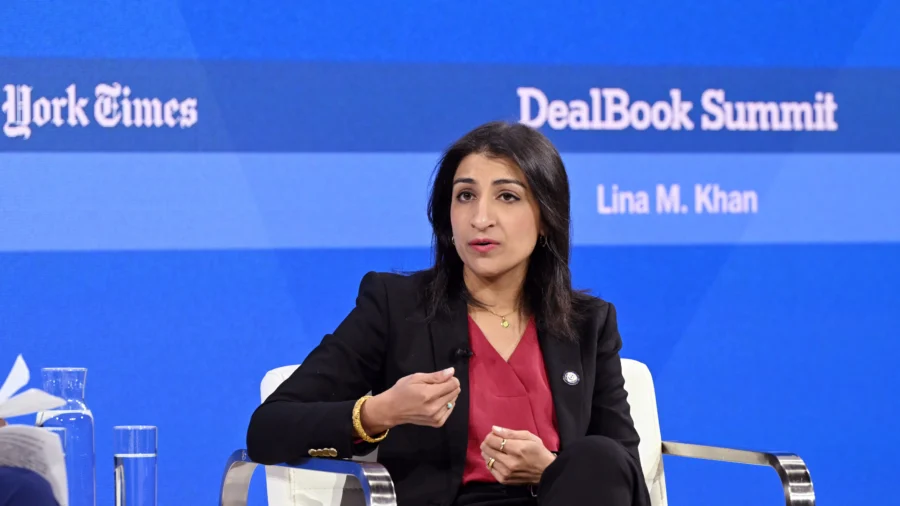Federal regulators have imposed a nationwide ban on the vast majority of non-compete agreements that prevent tens of millions of employees from working for competitors or starting a competing business after they leave their job, with the country’s biggest business lobby vowing to sue.
The Federal Trade Commission (FTC) voted 3–2 on April 23 to adopt a near-total ban on non-compete provisions, with the agency issuing a final rule that labels such agreements as an “unfair method of competition.”
The two Republican FTC Commissioners on the panel—Andrew Ferguson and Melissa Holyoak—both voted against the rule, which faced opposition from a number of congressional Republicans and business groups.
When it first proposed the ban in January 2023, the FTC argued that non-competes were “exploitative,” suppressed wages, and hampered innovation and competition. Holding that such agreements violate the Federal Trade Commission Act, the agency estimated that banning them could increase wages by $300 billion per year and expand opportunities for over 30 million Americans.
“Noncompete clauses keep wages low, suppress new ideas, and rob the American economy of dynamism, including from the more than 8,500 new startups that would be created a year once noncompetes are banned,” FTC Chair Lina Khan said in an April 23 statement upon announcement of the new rule.
“The FTC’s final rule to ban noncompetes will ensure Americans have the freedom to pursue a new job, start a new business, or bring a new idea to market,” she added.
Opponents of the ban, including some lawmakers and the U.S. Chamber of Commerce, argued that prohibiting non-compete agreements is a heavy-handed one-size-fits-all dictate from Washington that violates the spirit of federalism and impairs the ability of employers and employees to enter into contracts out of their own free will.
“The regulation would undermine the rule of law by invalidating tens of millions of existing contracts to which employers and employees voluntarily agreed,” the lawmakers wrote. “The rule is also inconsistent with tenets of federalism because it sets a one-size-fits-all approach that would outlaw practices that forty-seven states have deemed to be legal.”
The FTC said in its April 23 announcement that the vast majority of the 26,000 comments it received during the public comment period were favorable.
The original proposed version of the rule was stricter than the final version as it sought to ban existing non-competes with senior executives and had a narrower sale of business exception.
The final rule features an exception that allows non-competes between the seller and buyer of a business.
Looming Lawsuit
The U.S. Chamber of Commerce told reporters earlier that it would challenge the non-compete ban in court.
Shortly after the FTC first announced the proposed prohibition in January 2023, Sean Heather, the organization’s senior vice president for International Regulatory Affairs and Antitrust, expressed confidence that the rule wouldn’t survive a legal challenge.
“Today’s actions by the Federal Trade Commission to outright ban noncompete clauses in all employer contracts is blatantly unlawful,” Mr. Heather said at the time. “Since the agency’s creation over 100 years ago, Congress has never delegated the FTC anything close to the authority it would need to promulgate such a competition rule. The Chamber is confident that this unlawful action will not stand.”
He added that the FTC’s attempt to impose a blanket ban non-competes “overturns well-established state laws which have long governed their use and ignores the fact that, when appropriately used, noncompete agreements are an important tool in fostering innovation and preserving competition.”
The U.S. Chamber of Commerce did not respond to a request for comment on the FTC’s announcement of adoption of the ban.
President Joe Biden took to X to praise the decision, saying that “workers ought to have the right to choose who they work for.”
House Judiciary Democrats hailed the FTC’s move in a post on X, calling it a “game changer for American workers.”
More Details
Existing non-competes, meaning ones that are entered into before the rule goes into effect (120 days after publication in the Federal Register), become non-enforceable after the effective date if they apply to non-executive staff. For senior executives, existing non-compete agreements will stay in force beyond the effective date.
The FTC defines non-compete clauses as terms or conditions of employment that prohibit or penalize a worker from taking a job for a competitor or starting a competitive business. For purposes of applying the final rule, senior executives are defined as workers earning more than $151,164 per year and who are in policy-making positions. The agency estimates that fewer than 1 percent of workers are estimated to be senior executives under the new rule, per a fact sheet.
The rule requires employers to notify workers whose non-competes are no longer enforceable after it takes effect.
According to the fact sheet, “Roughly one in five Americans, totaling nearly 30 million people, are subject to noncompetes.”
The FTC estimates that banning non-competes will spur innovation and new business formation growth, creating over 8,500 new businesses each year and between 17,000 and 29,000 more patents each year over the next decade.
It also believes that workers will see their wages grow by $524 per year on average thanks to the ban, and that health care costs will fall by between $74 billion and $194 billion over the next decade due to reduced spending on physician services.
From The Epoch Times


